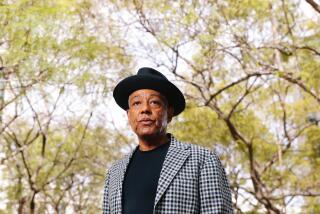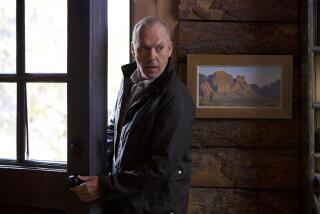‘Sopranos’ creator David Chase rocks on with ‘Not Fade Away’
NEW YORK — Ask David Chase why he chose a coming-of-age rock ‘n’ roll movie with few household stars as his first post-”Sopranos” effort and you’ll receive an unexpected answer.
“It was sort of inflicting punishment on myself to do the hardest thing you can do,” he said. “It’s a complicated psychological thing. There’s something perverse about it, really.”
Five years after he wrapped up his HBO show in controversial fashion, Chase has finally returned to the American screen. He has written and directed “Not Fade Away,” a story about a 19-year-old drummer named Douglas (John Magaro) living in the rock ‘n’ roll’s heyday of the mid-1960’s and the complicated relationships Douglas has with his bandmates, his unforgiving father, Pat (James Gandolfini), and his teenage crush Grace (Bella Heathcote).
Proving Chase’s point about the degree of difficulty, “Not Fade Away” (the movie takes its title from a Buddy Holly song that the Rolling Stones covered) has an abstract, digressive quality; one understands it via a series of vignettes more than a linear narrative.
“Not Fade Away” is concerned with gaps — generational and cultural gaps, but also the chasm between a band’s aspirations and its realities. Though lacking the crime backdrop of “The Sopranos,” it shares some similarities with the Emmy winner, particularly in its exploration of family dynamics. (Gandolfini’s Pat and Magaro’s Douglas reprise, in a way, the fraught father-son relationship Tony Soprano had with son A.J. and various proteges.)
There are other “Sopranos” echoes. Steven Van Zandt, who of course played consigliere Silvio Dante on the series, served a key role on the movie, helping the actors with their instruments and supervising the music. (He is credited as an executive producer.)
And “Not Fade Away” is set in familiar Chase territory: an Italian American immigrant community in suburban New Jersey.
But the specter of “The Sopranos” also creates an impossible standard for Chase.
“I read one of the early reviews that said ‘Not Fade Away’ ‘doesn’t live up to the promise of “The Sopranos,”’” the director, 67, said in his characteristically thoughtful but direct way. “No kidding,” he added, giving a small laugh. “So I should do nothing?”
The filmmaker is sitting in a lounge at the Lincoln Center complex, where “Not Fade Away” had its world premiere at the New York Film Festival on Saturday ahead of a Dec. 21 theatrical release from Paramount Pictures.
Though he resists the idea that the movie is directly autobiographical, Chase acknowledged that a number of elements line up with his own life. Chase is also music-obsessed and was in a band. He was roughly Douglas’ age in 1964, growing up in a similar New Jersey town. A key line from Grace was also uttered by the woman who would become Chase’s wife. Chase gave up music to pursue a screen career, as Douglas contemplates.
And maybe most important, Chase also clashed with a parent who came from another era.
“My father really didn’t like my appearance. He was fanatical about it,” Chase said. “His parents were immigrants, and all he wanted to do was assimilate. And here I was doing something that made me stand out.”
(It should be said that the movie pokes fun at rock ‘n’ roll preciousness as much as it does parental stodginess. When told by an older relative that rock music keeps you young, Douglas snobbily retorts, “Rock ‘n’ roll is an art form. Does Dostoevsky keep you young?”)
Perhaps because of the weekly fix “The Sopranos” gave fans, it seems like a lifetime ago since Chase produced something for the screen. In fact, he took off only about a year, during which time he didn’t write and simply thought about the idea for “Not Fade Away.” The remaining four years were devoted to writing, shooting and editing the movie, which made it through the Hollywood gantlet thanks not only to Chase’s post- “Sopranos” stock but also to his longtime friend and associate, Paramount chief Brad Grey, and the veteran Hollywood producer Mark Johnson.
The years since “The Sopranos” have been personally difficult, Chase admitted.
“All that fame and adulation is very, very addictive,” Chase said. “I didn’t care about it for a long time. Even at the end I didn’t want to be at the Emmys. But you go and it of course feels good, and after the show was done I thought, ‘How do I repeat that experience? Where’s the dealer for that? How do I shoot that up again?’”
One way he has opted not to do that is by refraining from revisiting his hit series on the big screen--despite the clamor of millions of fans.
“The idea of a ‘Sopranos’ movie is interesting to me,” Chase said. “It’s not something I would have done coming out of the experience, and it’s probably not something I will ever do. But the idea, the notion, of it, why would that not be appealing to me?”
(He said that on the slight chance any movie was ever made, it would take the form of a prequel; he would never want to extend the story beyond the show’s famed diner finale.)
Mainly, though, Chase is contemplating movie ideas — “mysteries, not whodunit mysteries, but the mysteries of the universe, like Kubrick did with ‘2001’ or ‘Barry Lyndon.’” He said he could perhaps “combin[e] it with a genre element.”
One thing Chase doesn’t talk much about these days is television. There’s an irony in a man who helped redefine the small screen now expressing very little desire to be there. Chase said he doesn’t even watch much television — mainly “Boardwalk Empire” and “Mad Men,” and even then only because the people behind them are friends.
In fact, Chase, who before “Sopranos” had written for shows as diverse as “Northern Exposure” and “The Rockford Files,” said he is pessimistic about the medium.
“Invariably the people at the networks and, I think, even in cable, will cook the vitamins out of anything. All the nutrition is gone. The string beans are damp. They’re limp and not crispy.”
Pressed about whether he thought TV producers had admired “The Sopranos” to the point that they wanted to continue its legacy, he said, “I don’t think so. I don’t watch enough television to know. But I don’t think that ‘The Mob Doctor’ is going to do it.”
PHOTOS AND MORE:
PHOTOS: Hollywood back lot moments
Latest movie reviews
PHOTOS: NC-17 movies: Why they got the rating
More to Read
Only good movies
Get the Indie Focus newsletter, Mark Olsen's weekly guide to the world of cinema.
You may occasionally receive promotional content from the Los Angeles Times.







